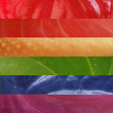404 plant (Schizocaulus resectus) is a quick-growing, rhizomatous perennial native to Central and Southeast Asia. The fleshy, spoon-shaped leaves emerge from beneath the soil singly, dying back with the onset of the dry season. Leaves are typically about 4 inches (10 cm) in length: they are green on the upper side and orange on the lower.
The rhizome grows quickly beneath the soil, and is capable of covering as much as eight feet (2.4 m) in a single season. It also branches at regular points along its length. With the onset of the dry season, much of the rhizome dies back, leaving only the last six inches (15 cm) or so of each branch. These points lie dormant in the ground until the rains return. Repeated cycles of this type can leave acres of land covered in Schizocaulus, until a surviving tree seedling manages to grow tall enough to begin shading it out: Schizocaulus is not shade-tolerant.
404 plant is not well-suited for garden or container culture. Though the leaves are attractive, its habit of rapid spread, followed by die-back, makes it difficult to contain in a garden. In the few instances where it has been deliberately cultivated as an ornamental, it has not come up in the same place from year to year, or has reappeared in undesired locations (such as a neighbor's yard), which limits its usefulness to most gardeners.
The plant flowers in mid-summer, on spikes of small orange flowers about six inches (15 cm) tall. They are pollinated primarily by bees and other insects. Seeds are shiny, oval, and black, about 1/4 inch (5 mm) in length.
Schizocaulus resectus has obvious invasive potential, and its transport is heavily regulated. The dried rhizomes are edible, with a mild bitter-savory taste, and find occasional use in cooking. Dried rhizomes so used may still resprout if wet, so one should freeze or grate rhizomes before putting them in the trash, to prevent introducing the plant to a new habitat via landfill. Leaves are non-poisonous but unpalatable to people and most animals: the only species known to consume the leaves in the wild are a handful of turtle species in Pakistan and India, and it does not appear to be a major food source for them.
The common name originates from internet culture, and refers to its changeable location: a "404 error" is when the client is unable to find a web page because it has been moved or deleted.
Wednesday, February 25, 2009
Fictional botany: Schizocaulus resectus
Labels:
fictional botany
Subscribe to:
Post Comments (Atom)






No comments:
Post a Comment